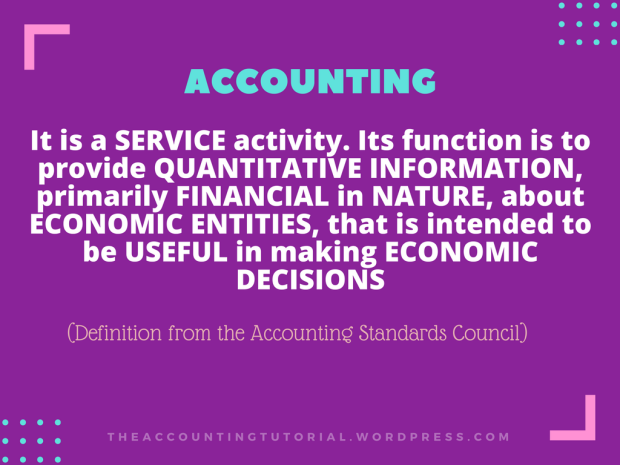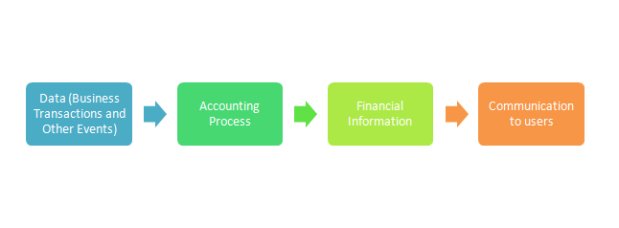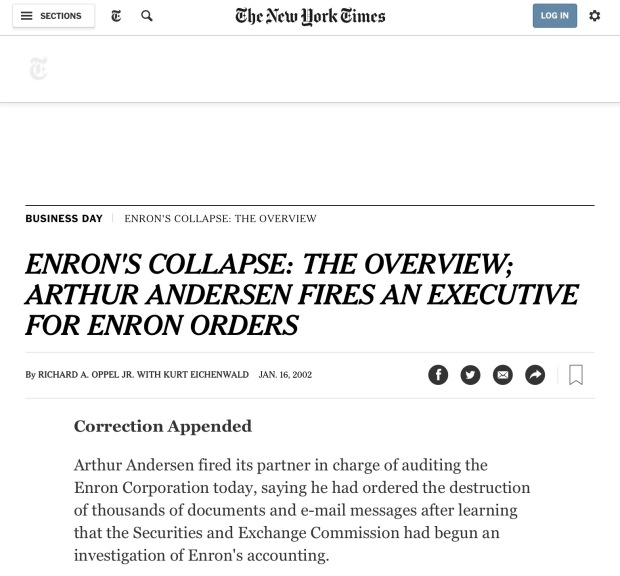Introduction: Accounting in a World Full of Resources

- Image from UC San Diego School of Medicine ; link URL:
https://ucsdcommunityhealth.org/work/local-food-system/
In our world, we believe that both individuals and organizations need proper accounting in order to fully manage our resources, at the same time meeting our priorities and achieving our goals. Our needs as an individual increases and changes as time pass by. As citizens of a society, we also help in the needs of others, specially our family and friends. Business organizations are also growing everywhere, thus increases the demands for available resources. Resources may come in the form of money and other mediums of exchange, materials, land, labor and so much more. But, resources are scarce. And it holds true since, we need to take care of our environment at the same time we constantly ask the environment to take care of our needs. In these present times where we are constantly into producing and consuming goods and services for our own betterment, proper accounting is indispensable for all economies globally in order for it to be feasible, effective and economical.
The Word “Accounting”

Let’s discuss it in a “common-sense” way. Accounting is the art of being ACCOUNTABLE.
We can say that being accountable is synonymous to being responsible, liable or answerable for a matter of things. According to Merriam-Webster dictionary online, being ACCOUNTABLE means (1) subject to giving an account, and (2) capable of being explained. The very root word is ACCOUNT which means, ”a statement explaining one’s conduct, a statement or exposition of reasons, causes or motives, or reason for an action.” With that said, accounting is also expressed in a form of communication, explaining the cause and effect of various matters entrusted with each person.
Now let us formally introduce the science of accounting, as it is dealt in the business environment.
The definition of Accounting in the Business Environment

The first definition says that accounting is a form of service aimed to provide a “communication” of financial information that is relevant for decision making.

This second definition of accounting talks of the steps in the Accounting Process. These are the steps undertaken to produce the financial information needed by users, of which they will interpret according to their needs. (Watch out for our Accounting Process blog post, to be published this November 2017.J)
But why is there a need for such communication of financial information?
Accounting and Society
In our society, artificial beings called “organizations” which are formed by a group of people exist for the fulfilment of a purpose. These organizations may be formed for-profit (well known as Business) or not-for-profit (Government/Charitable/Not-for-profit organizations). Every organization needs accounting in order to achieve their purpose, mission and goals. In addition, each organization is a “separate entity”, held accountable of all its dealings, separate from its owners. (Business Entity concept)
Accounting, as a service and form of communication
The science of accounting deals primarily with data, usually found in business transactions and events, of each organization which are FINANCIAL in nature. Relevant data will undergo an accounting process in order for it to be translated to useful financial information. There is a need for such information because every organization has its own stakeholders.

Every organization is accountable to its stakeholders as it impact lives of many people. An example of a stakeholder is the government, which regulates the operation of a business organization. The government is interested in knowing the business’ industry, its use of resources (e.g. materials, labor, land, etc.) and its capacity to generate a return/income. In response to such accountability, financial information generated by the accounting system of the business presents or communicates the results of all its business operations and other financial information which are useful for decision-making.
Studies covered by accounting

The study of accounting will also open you to the studies of business and management, marketing, audit, information systems, business law and taxation.
We would like to emphasize on this matter – what is the difference of bookkeeping from accounting? Well, bookkeeping is only a “phase” of accounting – that is, the recording phase. The whole accounting process consists of analyzing, recording, summarizing and interpreting financial information.
THE IMPORTANCE OF ACCOUNTING
Accounting is a vital function in our economy. Without accounting, it is impossible for business organizations and not-for-profit organizations alike (especially the huge, multinational, conglomerate organizations) to operate feasibly, effectively and economically.

Image from Indianic.com ; link URL:
http://www.indianic.com/blog/mobile/small-businesses-thriving-on-the-platform-of-mobiles.html
Management of Resources and Record Keeping
- Record keeping makes it easier to manage our resources. Without accounting, businesses may collapse and waste its resources. Resources are limited and crucial to a business entity. Choosing an appropriate accounting system for our organization will satisfy our need for every resource to be properly managed and accounted for. Record keeping can track, for example, whether the raw materials inventory of a manufacturing company are properly budgeted for each product and not wasted, or in case of direct labor, each laborer’s wage is just enough to compensate his/her share of work, etc.
- Proper record keeping also soothes the process in producing useful financial information.
- Sound management of resources enables us to track our progress towards the organizations’ overall goals, operations and aid in decision-making.
KNOW THIS:
In a world where business entities are growing, there is a corresponding need of increase in accountability. And this need give way to development of accounting standards throughout the world. In the early 2000’s we have heard of financial frauds that had happened in some big and well-known corporations.

Screenshot from New York Times Online ; link URL:
http://www.nytimes.com/2002/01/16/business/enron-s-collapse-overview-arthur-andersen-fires-executive-for-enron-orders.html
Without proper accounting, those scandals would not have been detected and the public will be negatively affected by such actions. The continuous evolvement of accounting standards and policies over time has helped expose and if not eliminate, significantly reduce financial scandals in recent years until now. Stronger accounting policies have been effected over time to discourage the unethical behaviours which happened in the past and promote fairness and reliability of financial information.
Useful for Economic Decisions
- They say accounting is the language of business. And in business, there are lots of economic decisions that need to be made. Economic decisions, relates to decisions that an entity makes regarding business and economy. They are important to every individual and organization because we all want to take actions in the future that will benefit us and not harm us.

Image from the telegraph ; link URL:
http://www.telegraph.co.uk/education/2017/08/12/students-choosing-a-levels-career-specific-subjects-less-attractive/
- The end product of the accounting process is useful financial information. A popular example is the financial report produced by a business every year. The organization’s stakeholders are most likely concerned about the financial report because they want to know how the business is doing, and in addition, they are concerned about their respective interests in the said organization (e.g. ownership interest, creditor interest, employee’s concern if a business can continue paying their salaries, etc.)
For example, the business owners and creditors will be interested in the business’ financial report so that they can make an economic decision regarding their interests in their business (e.g. whether to hold their interest in the business, or sell/remove it). They will also be interested if the cost of borrowing that the business owes to them can be paid without any difficulty on part of the business.
Just a reflection: Accountability, as emphasized on an individual basis

Image from Linkedin ; link URL:
https://www.linkedin.com/pulse/my-mbti-personality-type-dj-covington
“We are all held ACCOUNTABLE in the life we were given. Our values determine our way of life, and our way of life determines our choices, and our choices give birth to actions that yield results. We hold ourselves accountable for our actions and the accomplishment of our goals. Whether we experience failure at some time or achieve success, we learn from both events.”
They say that accountants are very practical in life. But that must be the effect of their accounting skills as used in the business. They are managing a business’s entire assets. They must make the most out of it and bring out a very favourable return to the business’ owner in the short-term time, but most especially in the long-term. Isn’t that what we also need to do in life? 🙂
We are entrusted with so many blessings in our lives – our values, talents, skills and even the gift of family and friends (taking care of them is a blessing because it is a way for us to help other people, whether they are family or not).We must live up to the fullness of our lives and properly account for all our blessings and make a favourable return to ourselves, and most especially to our Almighty Creator.

Image from Positive Psychology Online ; link URL:
https://positivepsychologyprogram.com/big-five-personality-theory/
Another important lesson we can learn from accountancy is having “balance”. In the famous accounting equation, “Assets = Liabilities + Equity”, both sides should always balance. Imbalance maybe caused by problems which needs to be solved right away. In life, it is healthy for us to not just only “work” but also take a time to enjoy our lives and appreciate its simplicity. You should use accounting in order for you to not “miss” out on life. (I’ll let you do the pondering here. J) Life is all about living it to its fullness, and so we strive to obtain balance in our career, family, relationships, and finances in our lives.

Image from Logic Central Online ; link URL:
http://www.logiccentralonline.com/corporate-community-package/
Aside from accountability touching so many areas in our lives, the study of Accounting is truly beneficial in managing our resources. Accounting knowledge will enable us to properly budget our resources (such as cash) and expenses. It helps us to allocate our resources carefully, according to our priorities, thus meeting our needs. Accounting can also motivate us to spend wisely, thus creating room for personal savings.
We would like to discuss “personal accounting” in another blog post later on. (Watch out for it! It will help you in managing your finances. 🙂

Image from Xamaze.com ; link URL:
http://xamaze.com/how-to-choose-a-tutor/
As you are studying this course, think of your plans for the future right now. What areas of your life can be greatly helped by accounting and how can it contribute to the achievement of your goals in the future? 🙂
Resources we used in writing this blog. (You may read them as well!)
Account | Definition by Merriam Webster. (n.d.). Retrieved July 3, 2017, from Merriam Webster: https://www.merriam-webster.com/dictionary/account
Accountable | Definition by Merriam Webster. (n.d.). Retrieved July 3, 2017, from Merriam-Webster: https://www.merriam-webster.com/dictionary/accountable
Accounting and Finance Courses | Benefits of Studying Accounting and Finance | Scope of Studying Accounting and Finance. (n.d.). Retrieved July 3, 2017, from Oxford Home Study College: http://www.oxfordhomestudy.com/accounting-and-finance-courses
Importance of Accounting/Accountancy. (n.d.). Retrieved July 3, 2017, from Hybrid Accountant: http://www.accountantnextdoor.com/importance-of-accounting-accountancy/
